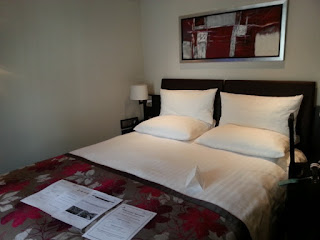If you've been on ocean cruises before, and not on a river cruise, you'd notice several differences upon arrival at the embarkation port. You'll probably first notice it's a much smaller ship with not as many people. Perhaps one of the most dramatic, and welcome differences, will be how easy the embarkation process is.
We will assume a European river cruise for the purposes of this post. Since most passengers are traveling from overseas, the cruise line offers a pre-cruise package. Selecting this option takes all the extra planning out of the equation and offers the most seamless experience.
You arrive at your destination one or two days before the cruise departure and are either met at the airport or you can arrange your own transportation to the pre--cruise hotel. Let's assume you have the first day to explore on your own. Most hotels have mid-afternoon check-in times, but they can store your baggage so that you aren't held hostage to your bags until then. You can then explore the city until later in the day.
The day of your cruise there are two choices: a pre-cruise excursion (usually at an extra cost ) or transportation to the pier. In either case, when you arrive at the ship, you'll drop off your baggage and meet in the lounge on the ship. The crew will take care of your checked bags.
Embarkation will take place in the ship's lounge. Someone from the crew will come around and check you in and then the staff will give a short briefing about the evening's events. After a champagne toast and introduction of the crew, it's time to head to your cabin to freshen up before dinner.
Welcome Aboard Briefing
Each evening you'll gather in the lounge for a briefing about the next day's tour options. On most cruise lines, there will be included excursions and there may be optional excursions available for additional cost. Most tours will have different groups so that you can participate at your own pace. Walking tours for example will have slow pace and fast pace at a minimum.
Besides the briefing, there usually is a cocktail hour before dinner. Most lines have open seating for dinner so you can meet different people throughout the cruise or stay with your own group.
To Be Continued ...
You've had an enjoyable day at the pre-cruise excursion. You've already made some new friends during the past two days, and you are planning to meet them for dinner. It's time to relax a bit before the evening festivities.
Click the banner above for the latest cruise promotions


Choose Cruise Month (click for mini-series)

Sign-up for Exclusive Email Offers
Where have you explored?
Gather your travel and food pics and join us every Wednesday night for the latest installment of #FoodTravelChat







